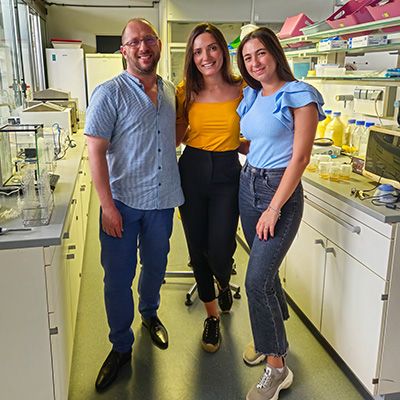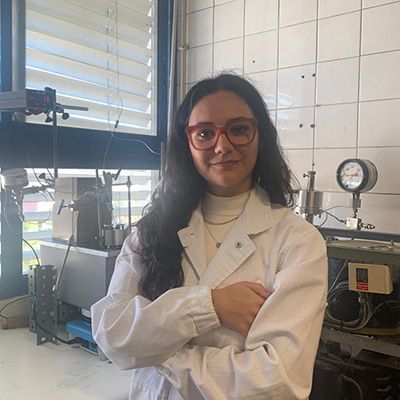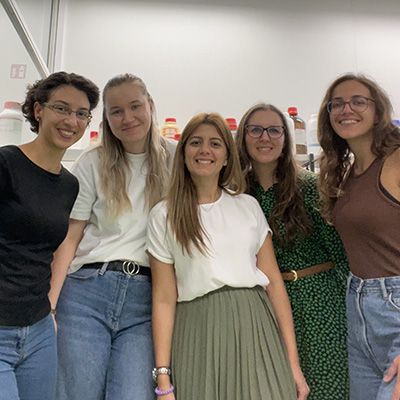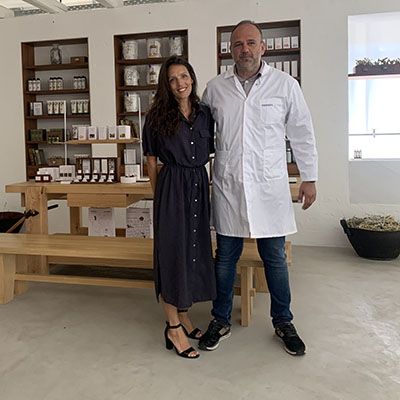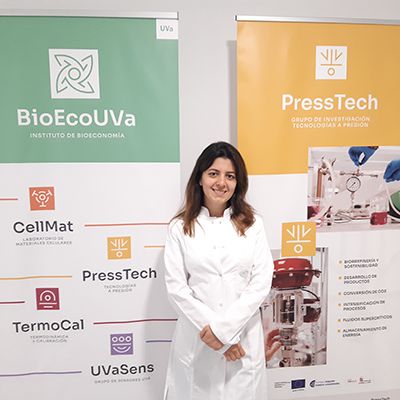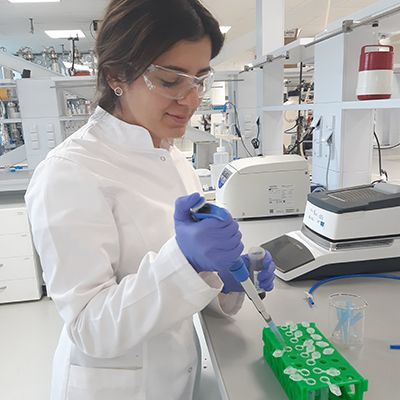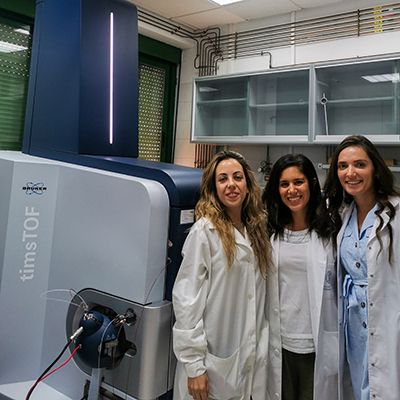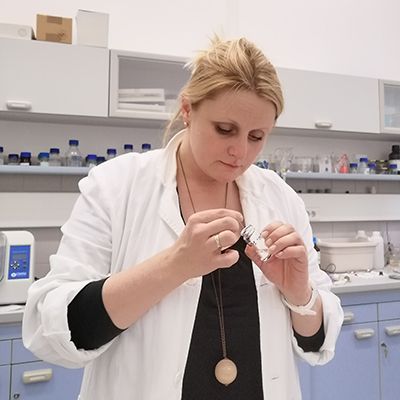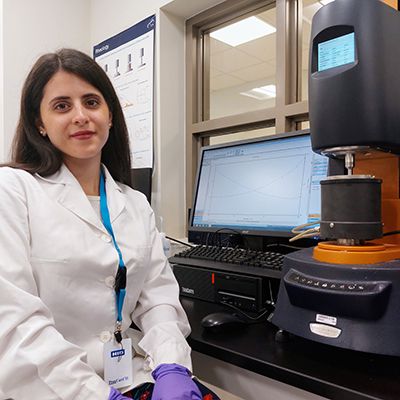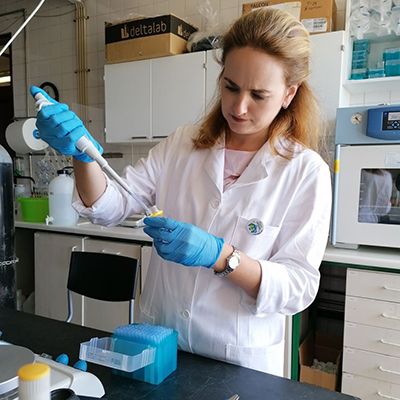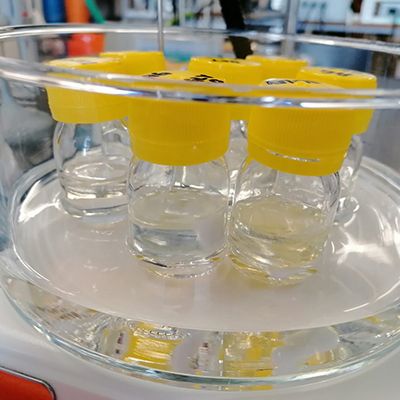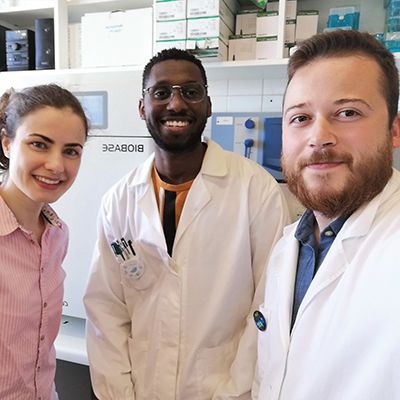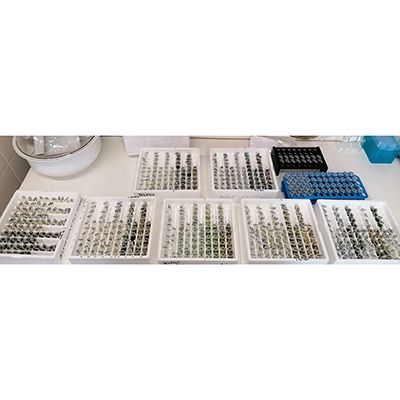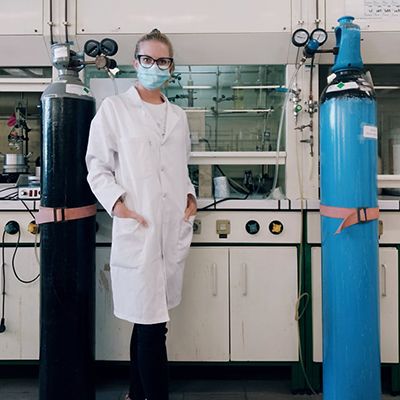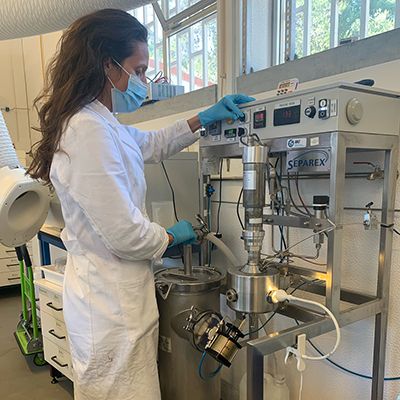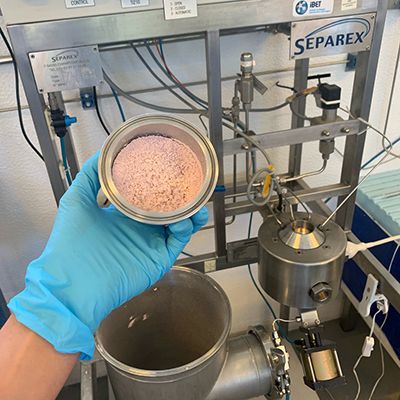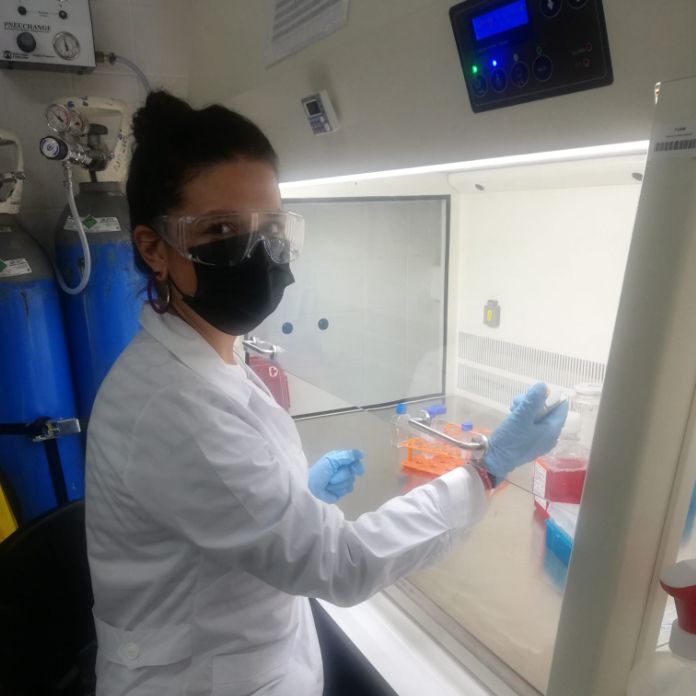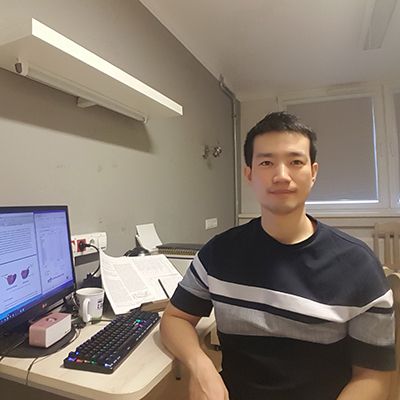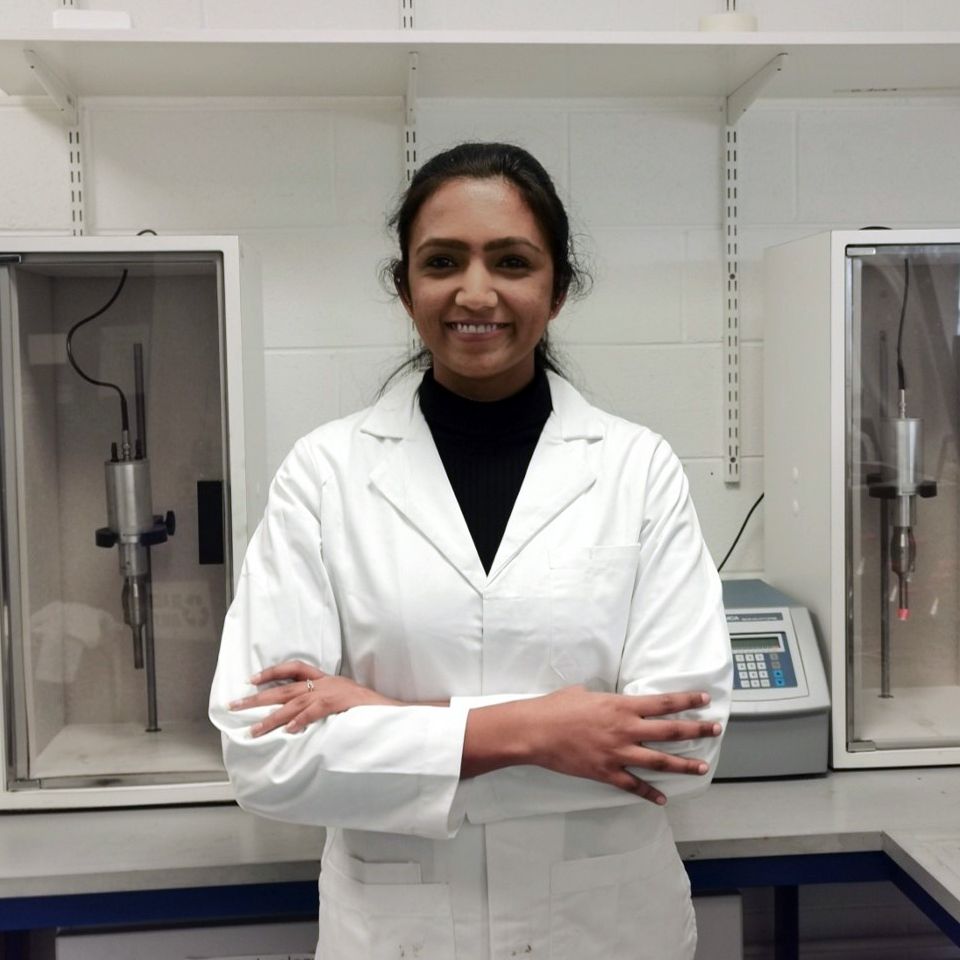STSM holders and their projects
STSM holder Slađana Krivošija
Slađana Krivošija, a research trainee from the Faculty of Technology Novi Sad (Serbia) received a STSM grant to perform research at biotechnological START UP Makabi Agritech d.o.o., Zagreb, Croatia. She worked under the supervision of prof. dr. Marko Vinceković. The main focus of this research was to propose an effective encapsulation strategy to observe the behavior of polar compounds obtained from orange peel by-products and to add value to this underexploited residue as a potential functional ingredient for pharmaceutical, cosmetic and/or food applications.
STSM holder Marianna Karadendrou
Marianna Karadendrou, a PhD student at School of Chemical Engineering, National Technical University of Athens, Greece, received a CA 18224 grant for a STSM at NADES Design (Zagreb, Croatia), under the supervision of Asocc. prof. Marina Cvjetko Bubalo, Prof. Ivana Radojčić Redovniković and Dr. Manuela Panić.
The main objective of her STSM was the investigation of the stability of enzymes in deep eutectic solvents and their immobilization in hydrogels.
STSM holder Eleonora La Greca
Eleonora La Greca from the Institute for the Study of Nanostructured Materials (ISMN- CNR), Palermo has been hosted by dr. Ana V. M. Nunes at the LAQV-REQUIMTE/FCT-NOVA University of Lisbon. Their work has been focused on the application of Ni-Ru catalysts for CO2 methanation reaction.
Eleonora's impression: Participating in a STSM proved profoundly enriching and enlightening. This opportunity served as a springboard for my research interests, particularly in the field of CO2 valorization, opening the doors to new concepts and different perspectives, never encountered before. Interacting with researchers from different backgrounds has significantly improved my knowledge of numerous topics. The stimulating exchange of ideas has allowed me to master new methodologies and approaches, broadening the horizons of my existing knowledge. This experience not only provided me with new knowledge, but also laid a solid foundation for my continued academic pursuits, promising growth and exploration in my field.
STSM holder Mirjana Sulejmanovic
NADES design (Zagreb, Croatia) hosted a young researcher, Mirjana Sulejmanovic from the Faculty of Technology Novi Sad (Serbia) within the COST Action Greenering.
Together with Dr. Manuela Panić and Prof. Dr. Ivana Radojčić Redovniković, Mirjana worked on the valorisation of by-products from the filter-tea industry, ginger herbal dust, by using environmentally friendly Deep Eutectic Solvents.
STSM holder lker Kaygusuz
lker Kaygusuz, a PhD student from METU Chemical Engineering Department Ankara (Turkey) performed his STSM research at the University of Twente (The Netherlands) under the supervision of dr. Nieck Benes. The focus of his STSM was to geometrically measure the swelling of Cellulose via ellipsometry in several representative organic solvents and to compare the results to gravimetrically obtained one
STSM holder Nataša Nastić
Dr. Nataša Nastić, a research associate at the Department of Pharmaceutical Engineering, Faculty of Technology Novi Sad (Serbia) had the opportunity to perform research in the RnD Laboratory of KORRES-Natural products in collaboration with prof. dr. Anastasia Detsi from the School of Chemical Engineering, NTUA. The main focus of this research was to propose a new method for the efficient encapsulation of the ginger by-product non-polar fractions using different nanocarriers.
George Stavropoulos, Scientific Affairs Manager at KORRES-Natural products supported this cooperation between academy and industry emphasizing the need for the industrial application of green chemistry and sustainable technologies.
STSM holder Adriana Viñas Ospino
Adriana Viñas Ospino from the University of Valencia, Spain, had the opportunity to make the STSM within the CA GREENERING in DES Solutio, a spin-off company in Lisbon, Portugal under the supervision of dr. Alexandre Paiva. Adriana carried out biological evaluation of the extracts obtained by hydrophobic DES from orange peels.
Adriana said that during her stay she learned protocols for cell culture and biological evaluation. The knowledge and skills learned in this STSM were very useful to continue developing her PhD thesis and continuing her formation as a researcher. The next steps will be to evaluate the biological activity of these extracts with other assays as anti-inflammatory and antibacterial. For her, being in the food science field, this STSM was a great opportunity to learn and work with people from different areas, such as engineering, biomedical, chemistry, and biotechnology. She is very grateful for this opportunity.
STSM holder Jesús Clemente
Jesús Clemente, a PhD student at the Miguel Hernández University in Spain, carried out a research stay at the Faculty of Agriculture, University of Zagreb, Croatia, under the supervision of prof. dr. Marko Vinceković. The main objective of his STSM was the extraction and encapsulation of bioactive compounds of two wild edible plants, Oxalis pes-caprae and Diplotaxis erucoides, through green strategies.
STSM holder Stamatia Christaki
Stamatia Christaki from Department of Food Science and Technology, Aristotle University of Thessaloniki, Greece has received a COST ACTION 18224 GREENERING grant for a short term scientific mission (STSM) at the Faculty of Technology Novi Sad, University of Novi Sad. She was working within XtractTeam under the supervision of prof. Senka Vidović. The STSM research was focused on the extraction of non-polar bioactive compounds from Curcuma longa (turmeric) using supercritical CO2 extraction and different pre-treatments.
STSM holder Martin Topiar
Ing. Martin Topiar from the Institute of Chemical Process Fundamentals of the CAS Prague, visited the Hamburg University of Technology. He worked on the enzyme induced biotransformation in supercritical CO2 using aerogels as carriers, under the supervision of prof. Dr. Pavel Gurikov.
STSM holder Mirjana Sulejmanović
Mirjana Sulejmanović, a junior researcher from the Department of Biotechnology and Pharmaceutical Engineering at the Faculty of Technology Novi Sad (Serbia), have carried out a STSM at the University Institute of Research in Bioeconomy (BioEcoUVa), Valladolid, under the supervision of prof. Dr María José Cocero Alonso and prof. Dr Soraya Rodríguez Rojo.
The research part of the STSM encompassed a by-product from the filter-tea industry, ginger herbal dust, which was processed by supercritical CO2 followed by pressurized liquid extraction using different concentrations of ethanol as a solvent.
Mirjana says that this STSM was a great opportunity to gain new experience in green extraction technologies which will have a big impact on the development of her PhD thesis. Furthermore, It was a pleasure to establish a new collaboration with the colleagues from BioEcoUVa.
STSM holder Slađana Krivošija
Junior researcher Slađana Krivošija from the Faculty of Technology, University of Novi Sad, has received a STSM grant for her research work at the SAC research lab of the Department of Analytical Chemistry, University of Córdoba, Spain. She completed her work under the supervision of Prof. Dr. Ana M. Ballesteros Gómez.
The main goal of her STSM is to propose new streams that use orange peel and ginger root herbal dust, a waste from the filter tea industry, as an efficient and alternative source of polyphenols and aromatic compounds. In order to increase their exploitation, she applied innovative green extraction methods.
Slađana says that this STSM has been a great opportunity to expand and improve her knowledge in the field of green extractions, which will have a great impact on the development of her doctoral thesis. In addition, she says that she was pleased to have the opportunity to work and exchange knowledge with colleagues from the SAC research group and hopes that this is just the beginning of their collaboration.
STSM holder Małgorzata Zakrzewska
Dr. Małgorzata Zakrzewska is a postdoctoral researcher at the NOVA University of Lisbon, Portugal, and since April 2022, the Principal Investigator of an exploratory project funded by the Portuguese Foundation for Science and Technology (Fundação para a Ciência e a Tecnologia). She has received the STSM Grant for her research work at the Faculty of Food Technology, the Josip Juraj Strossmayer University of Osijek, Croatia, in the group of Professor Maja Molnar.
The main objective of the exploratory project is to design a new process for the production of fuel additives from biomass-derived substrates, using a green chemistry approach. The work developed during the STSM involved application of Natural Deep Eutectic Systems (NADES) and different green synthetic methods (mechanochemical, microwave, ultrasound-assisted) in organic synthesis. The obtained results successfully set the direction for further steps of the project. Additionally, the STSM provided the opportunity to start a new collaboration leading to a joint project application.
STSM holder Débora Cerdá Bernad
Débora Cerdá Bernad, a PhD Student in Food Science and Technology, from Agro-food Technology Department at Miguel Hernández University of Elche (Spain), have carried out a STSM at the University of Ottawa (Canada), School of Nutrition Sciences, under the supervision of Dr. Nicolas Bordenave.
The work plan encompassed the valorization of saffron floral by-products employing them as ingredients with a minimal processing to reduce the environmental impact, by developing new sustainable model beverages, and to leverage their functional activities for human health studying the food matrix impact on the inhibition of digestive enzymes, and also the rheological properties.
Deborah: As a young researcher, to carry out this STSM was a great professional opportunity, since it allowed me to learn new techniques, methodologies, and ways of working to apply throughout my professional and research career, in addition to expand the network of collaborations with new research groups, which in the future would allow to start new projects or generate new opportunities.
STSM holder Aleksandra Gavarić
Dr. Aleksandra Gavarić from the Faculty of Technology Novi Sad, Serbia, has received a STSM Grant for research work at the Faculty of Science and Technology, University NOVA, Lisbon, under the supervision of prof. dr. Ana Rita Duarte. Her work plan encompassed valorization of by-products from filter-tea and beverage factories, rosehip herbal dust and rosehip seeds, which were defatted by supercritical CO2 prior to ultrasound-assisted extractions with NADES as solvent.
Aleksandra:This STSM has provided me with the opportunity to learn how to use alternative solvents (NADES) in accordance with green extraction principles in order to recover more polar compounds from plant material, as well as to exchange the knowledge and expertise with colleagues from Des.Solve Research Group.
STSM holder Siniša Simić
Junior researcher Siniša Simić from the Faculty of Technology, University of Novi Sad, has received a STSM grant for his research work at the Faculty of Science and Technology, University NOVA, Lisbon. He completed his work under the supervision of Dr. Jelena Vladić, within the research team of Prof. Dr. Ana Rita Duarte. The aim of his research work was to apply the ultrasound-assisted extraction in addition with Natural deep eutectic solvents (NaDES) in order to obtain the extracts of different microalgae species and to determine their biological activity.
Siniša says that this STSM has been a great opportunity for him to increase his knowledge in the field of Natural deep eutectic solvents (NaDES) and principles of Green chemistry in general, which will have a big impact on the development of his PhD thesis. Additionally, he says that he was thrilled to have the opportunity to work and exchange knowledge with the colleagues from Des. Solve research group and he hopes that this will be the stepping stone for their joined future projects.
STSM holder Natalia Czerwinska
Natalia Czerwinska, PhD student, from Universita Politecnica delle Marche, Italy, has received a STSM grant for her research at the Faculty of Science and Technology, University NOVA, Lisbon. The aim of her research was to recycle spent coffee grounds from businesses at a local scale (like coffee shops, cafes, universities, restaurants, self-service machines) and repurpose them in green, feasible, eco-friendly, and low-cost valuable products, targeting the preparation of biomass-derived activated carbons. She has done her research under the supervision of Dr. Maria Bernardo.
STSM holder Nataša Nastić
Dr. Nataša Nastić from the Faculty of Technology Novi Sad, Serbia, was a STSM Grant Holder of CA GREENERING 18224. Her host institution was the Institute of Experimental Biology and Technology - iBET, Oeiras, Portugal. She was working under the supervision of Dr Naiara Fernández Hernández, in the lab focusing on the green technologies. The research part of this STSM was focused on the application of innovative green technologies (UAE, SWE, SFE-CO2 with cosolvents and PGSS drying process) for the valorization of black elderberry by-product.
STSM holder Andromachi Tzani
Andromachi Tzani, from National Technical University of Athens, Greece, has received a STSM grant for her research at the DES Solutio from Lisbon, Portugal. She was working on her STSM “The Bioactivity of olive leave extracts on different natural deep eutectic systems”. She completed her work under the supervision of Prof. Dr. Ana Rita Duarte.
STSM holder Jeonghyun Kim
Jeonghyun Kim from Department of Civil Engineering, Wroclaw University of Science and Technology, Poland, was a STSM Grant Holder of CA GREENERING 18224. His host institution was the Universidade de Minho, Portugal. Kim studied civil engineering, and his research interests comprise recycling of construction materials, such as concrete and bitumen, and concrete mix design taking into account the characteristics of recycled aggregate. Kim research focuses was on the mechanical properties at later ages. Therefore, the main objective of his STSM was to acquire knowledge of measurements technique for cementitious materials at early-ages to better understand the behavior of recycled aggregate concrete.
STSM holder Keerthi Manikandan
Keerthi Manikandan from the Institute of Technology, Sligo, Irland, was a STSM Grant Holder of CA GREENERING 18224. His host institution was the University of Twente, Nederlands, where she conducted her research “Investigation of the efficiency of carbon coated black silicon (C-BSi) microelectrodes as cathode materials for photo-electro Fenton reaction”.
Aim of her research was to deposit sp2 carbon materials having π electrons on to the black silicon, and to measure the rate of hydroxyl radical formation and organic pollutant degradation via photo-electro Fenton (PEF) reaction. The incorporation of carbon is expected to improve the optical absorption of the material over a wide spectral band. Hence, the overall efficiency of the PEF reaction is expected to increase.
COST (European Cooperation in Science and Technology) is a funding agency for research and innovation networks. COST Actions help connect research initiatives across Europe and enable scientists to grow their ideas by sharing them with their peers. This boosts their research, career and innovation.
Action Details
- MoU - 041/19
- CSO Approval date - 04/06/2019
- Start of Action - 14/10/2019
- End of action- 13/04/2024
Former end of action - 13/10/2023
